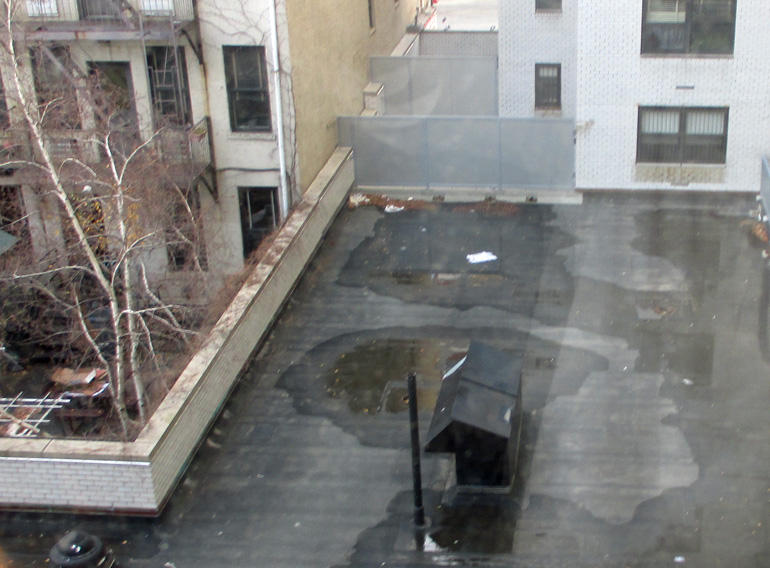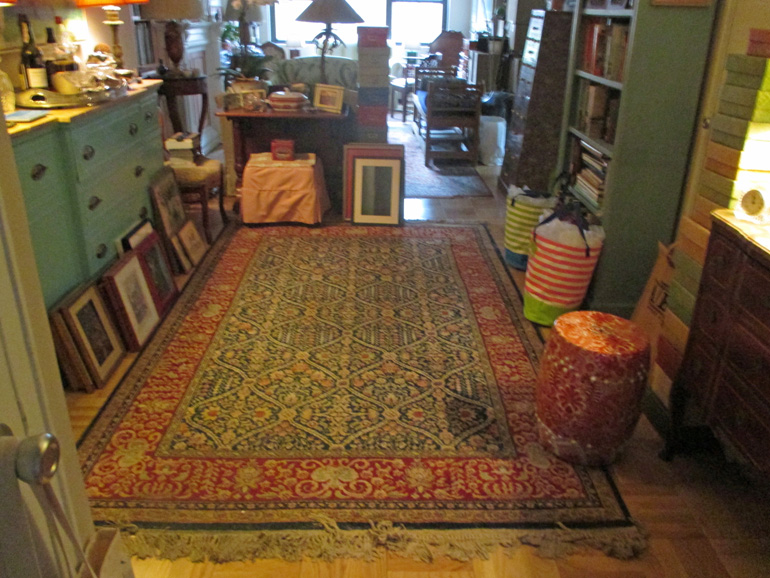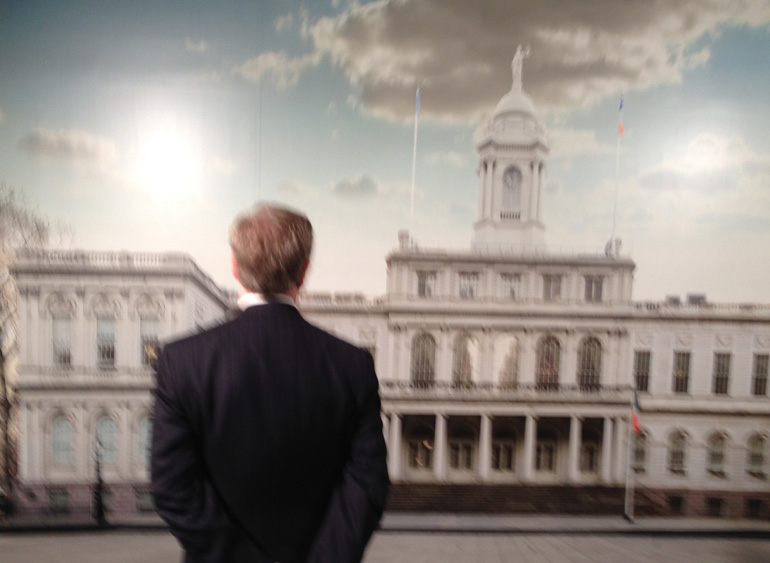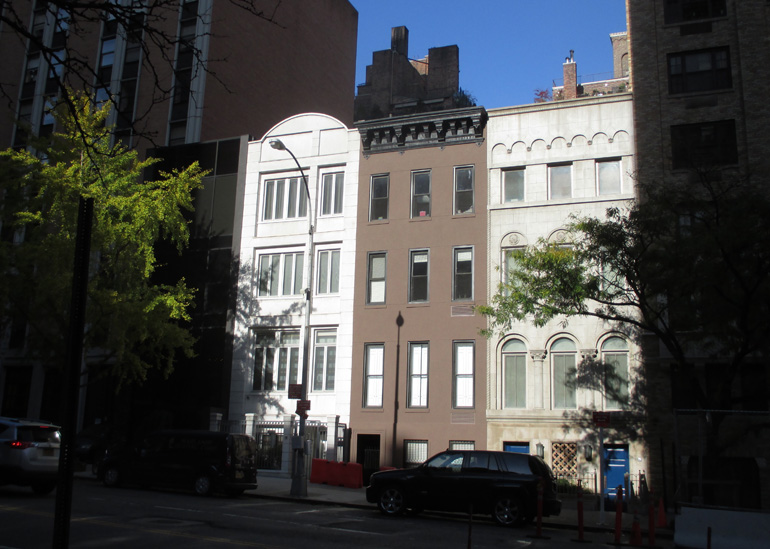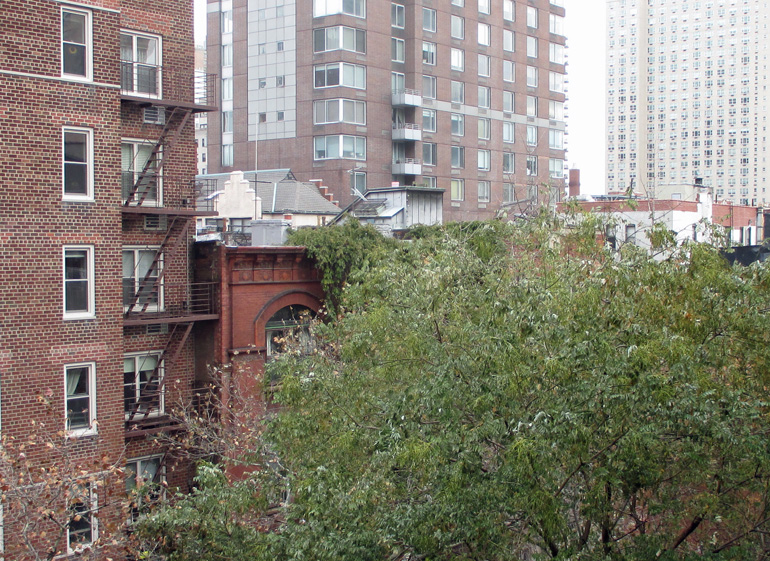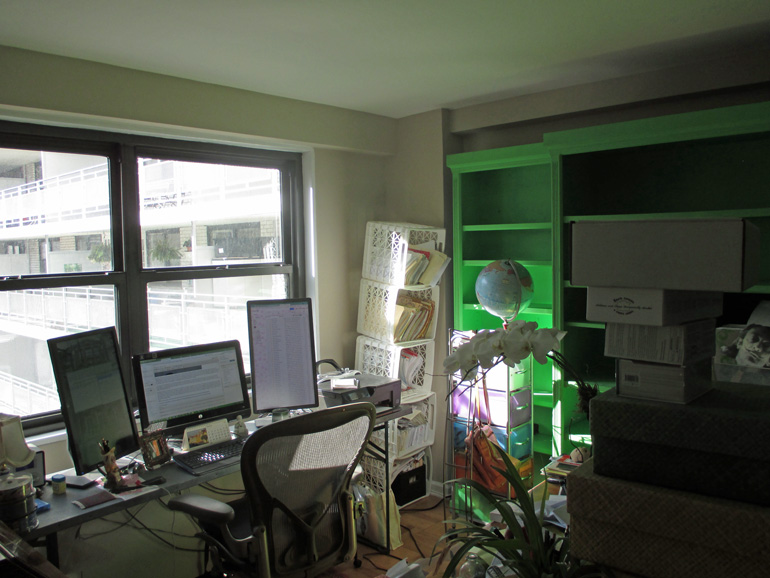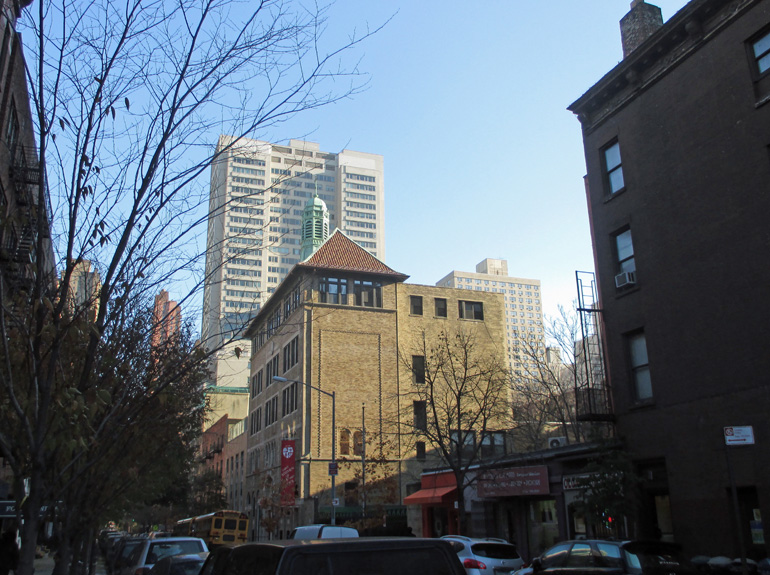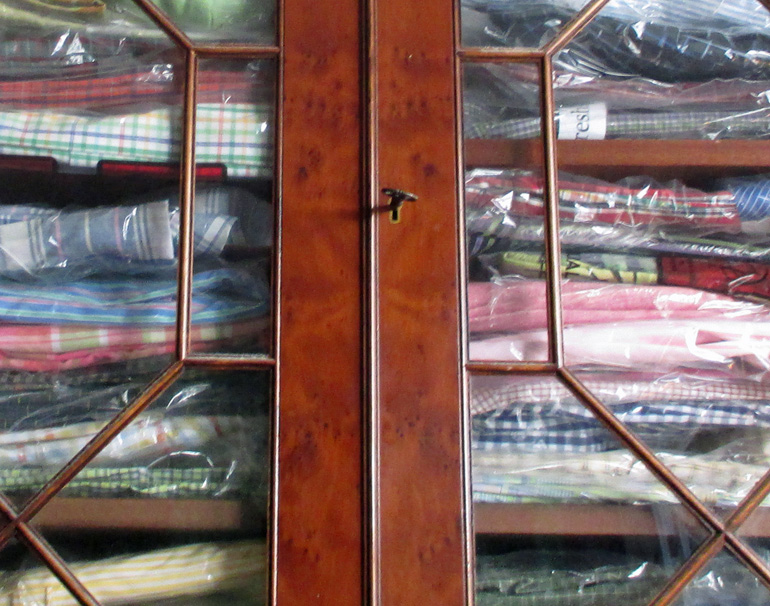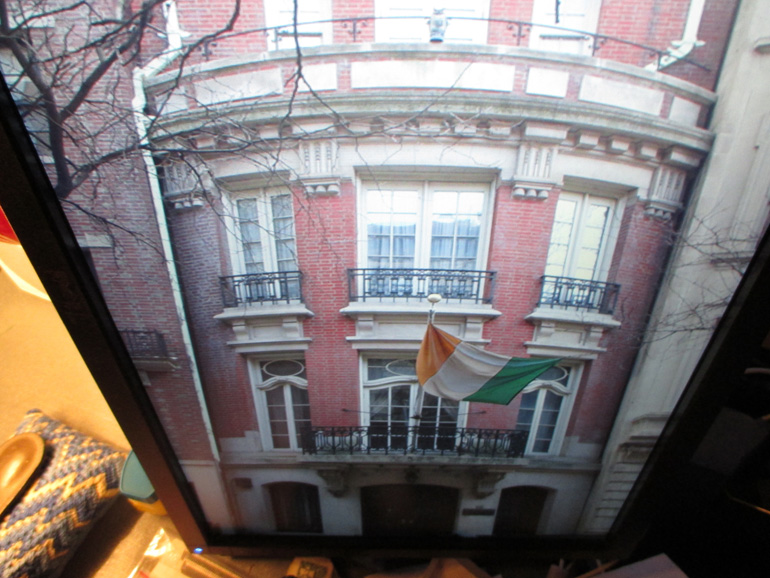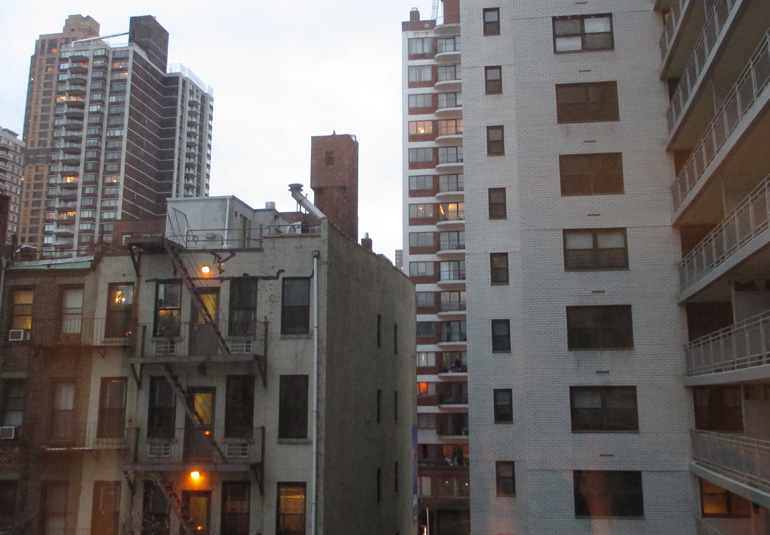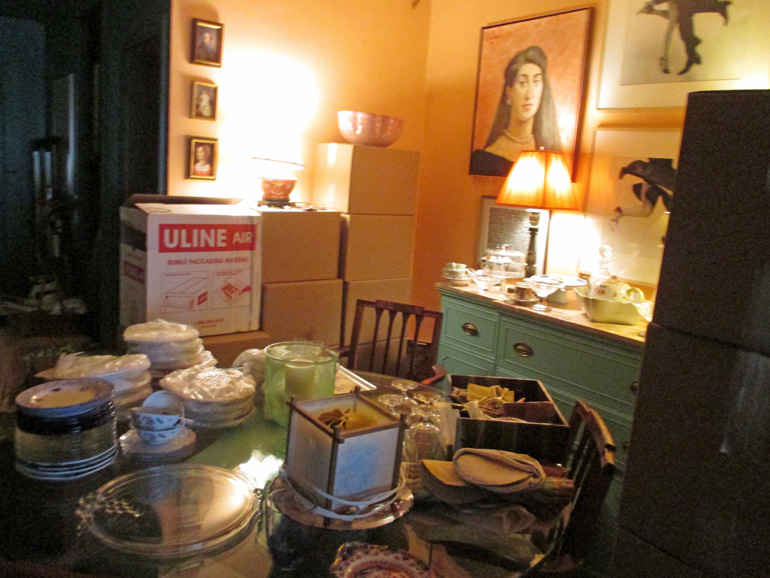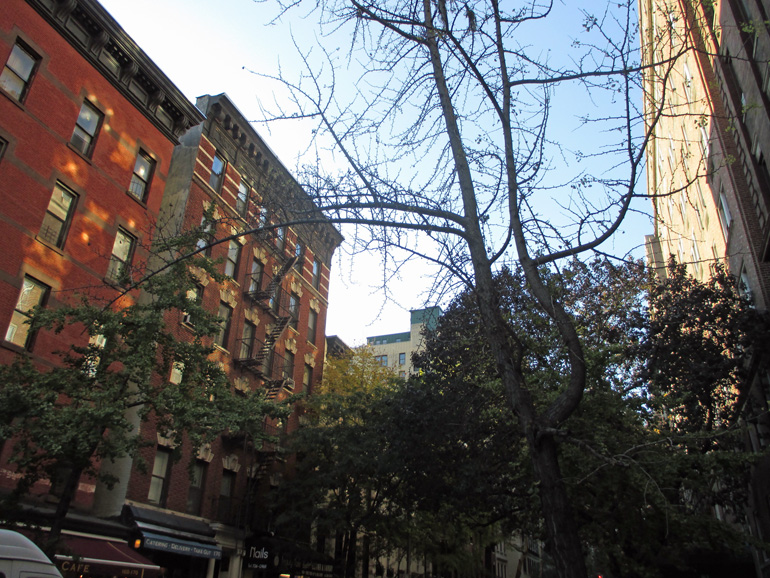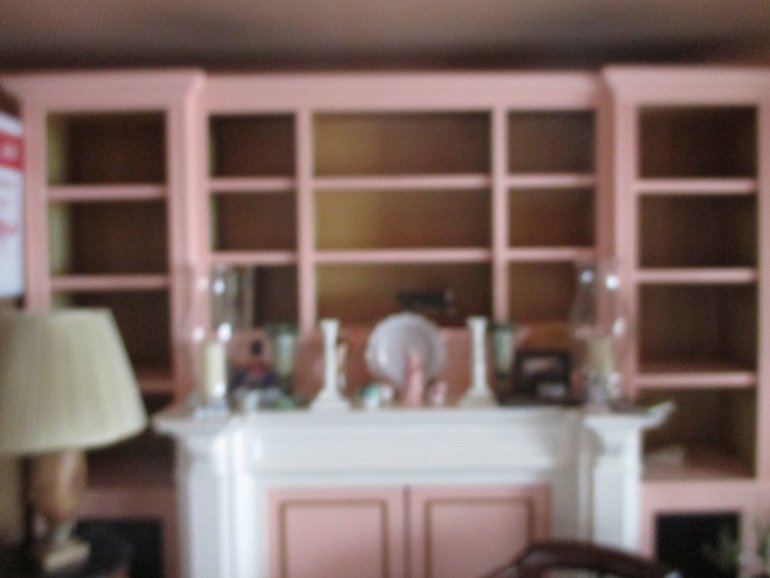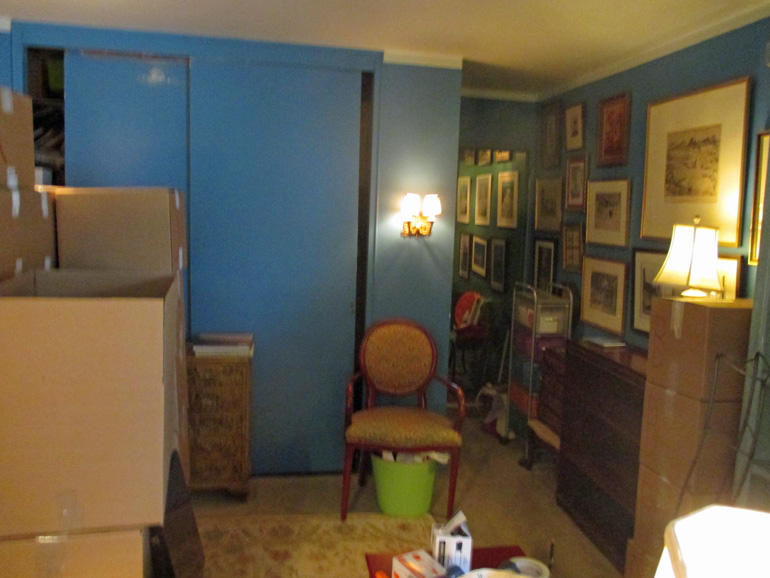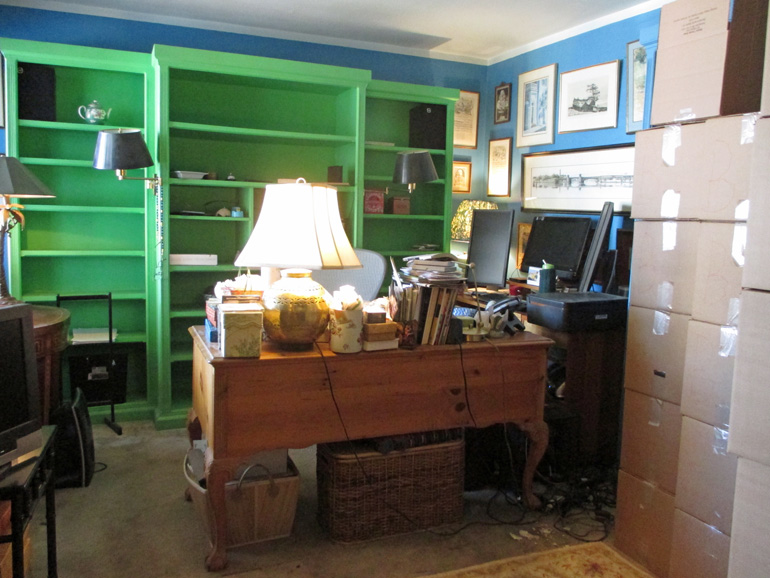
Monday
My writing table has become an island of mess in a desolate waste. The urge to sweep it clear is very strong. But sweep it clear to where?
I have made an unspecified number of trips to a lower floor. I have had plenty of help. And yet this old apartment remains, basically, crammed. The tipping point has not been reached. By the end of the week, however, it will all be over. It will have to be, contractually.
When I woke up yesterday, I managed to fix a nice weekend breakfast, but I hardly made it through the Times afterward without longing to crawl back into bed. Instead of which, I got dressed and went downstairs with Kathleen. Kathleen was busy with bubble wrap yesterday — that is her specialty. The bubble wrap work is largely complete. Most fragile items have been protected. It astonishes me to see how many of our belongings are not fragile.
I expect that Kathleen is dozing on the train. She has a meeting in Washington this afternoon, and the Acela is not running for some reason, so Kathleen will spend the bulk of the day on a train. (She looked into flights: they’re twice as expensive. When did that happen? Good that it did, though.) I will not be dozing. I will be emptying the kitchen, and making more trips to the lower floor. Many more trips. These trips are occasions for thought, but not for thoughts about anything of interest to readers of this Web log.
***
Tuesday
Just lost an entry. Was signed out but didn’t know it. Surprise! Very tired.
***
Wednesday
The computer has been relocated to the lower floor. It developed a glitch overnight, but evidently not one to disturb the communication of my lofty thoughts. At least my eyes are lifted. The new view is full of buildings that rise high about me. I had no view at all in the old apartment; my computer desk faced a wall. Even when it faced a window, there was no view, because all I could see from my desk was the balcony. Now I have a view not entirely unlike the view from the balcony (the one upstairs). No horizon, to be sure. But plenty of apartment windows, and these are now much closer. Not too close — not too close for me. Kathleen deplores the Rear Window quality of the view from our bedroom (and from the book room, which is right next to it), but I rather like it.
The view from the living room is charming — but I’ve already mentioned it. The building across the street is not in fact Victorian but midcentury urban vernacular. It’s pleasant to look at by day, because it is clad in red brick. At night, not so much. Almost every room appears to be lighted by a glaring ceiling fixture. The non-descript walls are mostly bare. All of this is obvious to the aimless eye; you can’t help but notice.
So it is all very different on the lower floor. The pluses outweigh the minuses, I think, but we’re not entirely in yet; the final move isn’t until Friday. (Then we’ll find out just how screwed we are on the closet front.) Right now, it’s just different. The weather has turned damp. The sky is a dull white not unlike the bricks of this building, which are very much part of the new view. The weather is not uplifting. But I can see it now.
I struggled all day yesterday, amidst many other tasks, to empty the old kitchen, which I had rather naively hoped to accomplish on Monday. Great progress was made, but the closer I got to attainment, the more recalcitrant and obtrusive the remaining items became. And it soon came to pass that the new kitchen was full. Nicely full, that is — not crammed. The cabinets were not stuffed with odds and ends, and I was determined to keep them that way. So the elementary rules of physics — everything must be somewhere, and two things can’t occupy the same space — are giving me a headache. That’s why I’m writing here. It’s so agreeable to accomplish something. There’s a bag in the foyer that’s stuffed with bubble-wrapped breakables — soufflé dishes, small plates — and I’ve no idea what I’m going to do with them after I unpack it.
It’s good to be in the presence of words. My own words, yes, but also those of Marilynne Robinson, whose essay collection, When I Was a Child I Read Books, has been my companion this week. On equality in America:
The meaning of it is much disputed — does it mean equality of opportunity or equality of outcome? Frankly, if we were to achieve either we might find that it resembled the other nearly enough to make the question moot.
I find Robinson’s small-bore but perfectly-aimed shots at philosophy deeply refreshing. So much of what passes for elevated discourse is simply juvenile hair-splitting. To propose a distinction between equality of opportunity and equality of outcome and then to erect a political dualism on facing fronts sounds a lot cleverer than it really is, and, what’s worse, it sucks up the energy that actually working for equality would achieve. At the risk of proposing a fatuity of my own, I’d say that we are much more agitated by gross inequality than we are attracted to generally uniform equality. We don’t want everyone to be the same, but we don’t want anyone to go without the resources of a decent life — our very idea of those resources and of that decent life shaped by the condition of fortunate people. Some day, we will know enough about the brain and its impact on personal character to match students with teachers who will most effectively educate them. Until then, university will be a hit-or-miss affair. Most university life today seems to be a social occasion. I can’t think why anyone would worry about equality of access to our “best schools.”
One reason why I lost yesterday’s entry (because I didn’t look to see if I was signed out — I never do — and because I failed to copy and save the HTML before clicking on the “update” button — which I always do) is that I walked to Gracious Home at lunchtime. I wanted to buy a card table and a trash can. I had looked at the store’s Web site the night before, but there was only one table on offer, while the array of trash cans was visually bewildering — every item was shown at the same size. The table didn’t thrill me, but I ended up buying it, because the other table that was on offer at the store was even less thrilling. As for the trash can, I chose a small cylindrical one that I should have preferred in oblong form. The oblong trash cans were all much too large. Having opted for delivery of my purchases, I couldn’t very well indulge in a taxi ride home. I couldn’t say that I needed the exercise, either, but I was too tired to be bored by the same old Upper East Side sights.
Now I must run upstairs, to get a few things that will improve the quality of life in the book room. By the way, the writing table shown above is now on the lower floor, right behind me in fact, and, aside from two potted plants, empty.
And now there’s a lamp as well. It’s time for lunch, but I haven’t the strength. I’ve been yielding to a relatively sordid impulse lately and taken to patronizing Burger King about once every two weeks. I bring the food back to the apartment. Burger King is just a few up the street from Fairway. First I do the healthy shopping, then the gross.
***
Still Wednesday
At Fairway, I couldn’t decide what to buy for dinner, so I bought for three. Thus was I too laden for a side trip to Burger King. So I came home and made a sandwich (ham and Swiss). I read Marilynne Robinson on one of her favorite subjects, rapidly becoming one of mine: bogus scientism. This largely is a problem of journalism, I think, of professional commentators who insult their best traditions with fuzzy, armchair ideas that generate not good writing but readable copy. Life is both too complicated (particle physics; the human brain) and too simple (hey, just look around!) for journalism. It tempts us with revelations that (the smarter we are, the better we know) we don’t really understand, and with promises of inside information that ipso facto can’t be truly “inside.” There are days when The New York Times is really too twaddlesome to read.
Robinson writes about the conundrums that bogus scientism has created about human nature. How much of our makeup reflects “adaptation,” and how much is “accidental”? “Natural” is defined, basically, as “Pleistocene.” This is nothing but the age-old complaint about Golden Ages, the Fall of Man, and the State of Nature, dressed up in a mongrel word that’s half-Latin and half-Greek. Once upon a time — well, at least we know that we didn’t ride around on the backs of dinosaurs. But life was, it is alleged, “simpler.” I rather doubt it! You try keeping clean and fresh without the help of a modern bathroom and a good washer/drier! (My dear, quipped a noblewoman at Versailles, her hands were as dirty as my feet!)
Because they usually spend so little time with them, grown men have a habit of imagining that children lead simple lives, and this is probably the root of the nostalgia for Neverland. But nobody’s life is simple, at least without the narcotizing help of stultifying routine. What life brings over time is not an increase of complexity but an ever-growing load of memories, many of them calcified into a sense of disappointment. Disappointment is not only a very bad habit, reflecting a failure of generosity toward oneself, but an indicator of groundless expectations. It doesn’t really matter what exactly didn’t happen, given all that did. This not a matter of simple-mindedly looking on the bright side of things. It is rather one of looking very close.
(What is an article about the caricatures policy at the new Palm doing in a newspaper?) (Oh, and the other day, the Times took care to identify Calais as a “French port.” I don’t think that anyone unaware of that fact — anyone raised in the Anglophone tradition, that is — ought to be allowed to read the Times.)
After lunch, I thought that I’d read a little and perhaps write a little, but I had to brush my teeth, and my toothbrush is still upstairs. So I gathered up the totes. After taking care of myself, I brought down all the remaining liquor, the fish poacher, and two desktop receptacles. One contains my little black book — actually a tiny address book produced for the Vuillard show at the Montréal Musée des Beaux Arts. The other holds a collection of neatly trimmed clippings with important recipes, such as the one for roast beef with “Henry Bain sauce” and the even more vital one for Marcella Hazan’s simplicissimo tomato sauce (long-simmered tomatoes, halved onion, and hunk of butter). Unless I decide to roast a chicken, I will need one of these recipes later this afternoon. My toothbrush, however, is still upstairs.
***
Thursday, briefly
We were saved by the cable guy, of all people — but to hear that story about moving day T – 1 and its abrasive effect upon marital harmony, you will have to send me a very large cheque — the kind that’s spelled that way.
In the morning, I struggled with counting bricks. Not real bricks — perhaps that was the problem — but clever faux plastic ones, half as thick and not even a tenth of the weight of a real brick, designed for garden walkways but perfect for New York balconies, which are surfaced in uninviting concrete upon which tenants soon learn that carpeting (of any kind) is not the answer. The plastic bricks, which snap together, are perfect for dirt and everything else that befalls a balcony: to sweep is to tidy. Messy particles fall between the cracks, and the worst that can happen is the stray weed.
Our upstairs balcony took about 600 bricks. A pricey proposition, but worth it. Even pricier now, perhaps, as the widgets have gone out of production — probably because it was left to me to discover their aptitude for grimy Gotham. On Saturday, Ms NOLA and her husband, ED, packed up enough bricks to pave our new, smaller balcony, which is less than half the size. Later in the week, our lovely neighbor, who has already taken so much off our hands (for which we are the grateful ones, as, knowing where our pieces are, we don’t really feel that we have lost them, change of title notwithstanding), accepted our offer to give her (for the duration of her tenancy) enough bricks to cover her balcony, which is of the same size. That being the case, I knew that we could calculate the number of bricks to pack for her. So I set out to count them.
The rest of the story will have to wait for tomorrow, as Kathleen has just finished the task that brought us down here on a midnight run (practically), and we really must get to bed.
***
Friday — beyond panic
How about counting boxes of books? With one of those sideways eights.
The worst of it is that the bookcases ought to be repainted (while they’re still empty). The two largest cases, moreover, have to be re-assembled by the cabinet men (on Tuesday). So we shall be living with walls of boxed books, with narrow corridors threading among them.
We still have to do something about our clothes, and the pictures on the walls — and compete with the renovators working on the 19th floor for the elevator. Fun.
***
Friday/Saturday, Kathleen asleep
A wonderful day, despite the awful moment when I paid a visit to the old apartment after the movers left and saw what to be moved remained. Even so, my plans for the new apartment blossomed beyond my dreams, with an unfailing spaciousness of atmosphere that I resolved to preserve from clutter of any kind, no matter what might have to go in order to keep the new place “clean.” Even when I’m done, of course, there will be twice as many objects as a normally stylish person would allow, and even now I’m coping with the problem of the love-seat echo — the sight of one sofa-for-two positioned just beyond, no further than would be the case in a furniture showroom, another. If that is to be the worst of my worries, I’m a very lucky householder.
It would not have happened without Ray Soleil. I should have felt that I was taking grotesque advantage of his generosity if he had not revealed, over and over again, the pleasure that he takes in getting details obsessively right. This zeal was matched, however, by a willingness to do brute service that one seldom encounters in an intelligent person (namely, me), and it was crowned at the end by his hanging of our largest picture, a painting whose creator, as it happens, was considering scraping it down, to reuse the canvas, when I worked out a trade involving the entirety of my classical-LP collection. There is no reason to think that the picture will ever be mounted in a museum, but it has aged — lived — well, very well, and those who get to know it tend to love it.
For about twenty-five years, it hung opposite our bed, and I can’t tell you how many imaginary faces and beasts I have seen in its sketches of Houstonian arbors — for it was then, in my radio days, that the picture was acquired. Kathleen has always been a great fan, and, lately, so has Ray. I myself was beginning to feel like the artist: I was almost ready to have the canvas unstretched and rolled, because the necessary wall space seemed to be lacking in the new apartment. But Ray pressured me to rethink my ideas for the foyer, which is where Sam Philpot’s painting now hangs, already in pride of place and obviously, at least in our apartment, a masterpiece. Even the whorehouse-red lampshades (inspired by Raise the Red Lantern, in color if not in shape) that stand on the sideboard beneath it do nothing but intensify the painting’s enthusiasm for the hue of canna lilies. Kathleen and Ray both insist that they now see a range of blues that they had not noticed before. This is going slightly too far for me. The painting, which, now I think of it, needs a title, has always been for me a study in green, greens of every kind, with counterpoint in Chinese red. It’s no wonder I gave away all my records for it (even the Karajan Rosenkavalier). But not on account of its blues.
It is like the early days of the Soviet Revolution, when brainy people had reason to be hopeful. We chant the B-52s’ line and promise to leave our behinds in the past. This means that we don’t put things behind other things, where they will stand untended, gathering disgusting coats of dust, whilst we go about our lazy lives. We don’t and we won’t. And yet: what’s behind the chairs in the bedroom but the entirety of our collection, or nearly, of framed artworks? Everything but the paintings is stacked on the floor — there was nowhere else to put it. Sam’s picture is up, and Kathleen’s Camp Wohelo paddle, and the Mexican Madonna, painted on tin, that my mother acquired during those Houston days and that I have hung reverentially (though revering I know not what) ever since I came into possession of it. Also — this was the first thing to go up — the Louis Phooey mirror, of cheval-glass length, that Ray insisted upon mounting over what we call “the commode,” a three-drawer Louis Phooey side table (Third Republic doubtless) that Kathleen and I purchased at auction when her parents were unloading their “investment” pieces. Kathleen is the only person in the world who thinks that it was normal not only to buy but to pay top dollar for her parents’ heirlooms, but I cannot claim to be bewildered or even unsympathetic, even if our bid for the five-legged fauteuil that we really wanted was surpassed by someone else’s. I never felt more authentically WASP (which of course I can never legitimately feel, having belonged to the Catholic minority in Bronxville) than when we wrote the check for that commode.
Interesting to think that there are social worlds in which the word “commode” means something very different from something that you would pay a lot of money to buy from your family.
I see that I never told the story about counting bricks. The faux plastic bricks that I was talking about, and which the movers brought down to the new apartment, then returned to the higher floor on which we used to live, placing them this time outside the door of the neighbor who wanted them, can be laid down any way you like, but they’re really intended to be placed in alternating pairs — two aligned north-south, say, surrounded by pairs aligned east-west. Counting the bricks on our balcony, I counted the pairs. Eight (or was it nine?) pairs deep, and fifteen pairs wide. The problem arose with multiplication. I ought to have known that, in the two-dimensional world that I was measuring, the pair factor could count only once. There could be eight rows of fifteen pairs, or fifteen rows of eight, but the total number of bricks involved was not the product of sixteen bricks by thirty.
I don’t have a head for numbers. Or rather, I have a head for numbers in which some numbers are far more interesting than others; say, four over seven or nine. I can ‘t say that I’m in love with foursomes, but I do love the number four — I believe, I suspect, that it is God. The fact that numbers are not equal, qua numbers, makes calculation very difficult for me. You’d think that, being the man I am, I’d have a natural sympathy for odd numbers, but I don’t. Quite the reverse.
As it turned out, there simply weren’t enough bricks to fill the boxes that I thought that our neighbor needed. Kathleen, who has become a reluctant observer, rather than a connoisseur, of my intellectual weaknesses, kept telling me that my calculations were wrong, but since her math is even worse than mine she was unwilling to press the point. Eventually I figured out that I was trying to cube, if not a circle, the balcony.
Sometimes it would be simpler just to count the goddam bricks. One by one.
As she was falling asleep, Kathleen mentioned that she was doing so on our first night in the new apartment. A very perfect killjoy, I replied that this was the fourth time that we would be falling asleep in a new (to us) apartment in this building. Kathleen managed to fall asleep nonetheless, thus answering the question that Ray Soleil asked during our adventures on this long but heroic day. “How has she stayed married to you?” Kathleen can always — always — fall asleep.

Bon weekend à tous!


